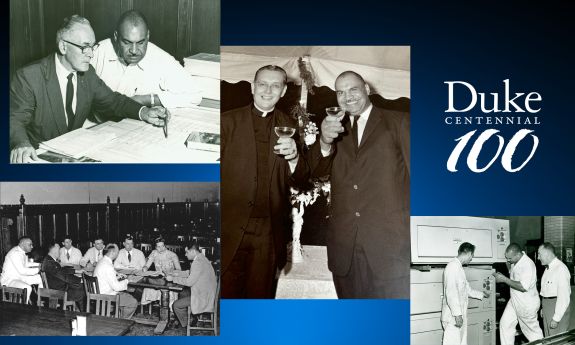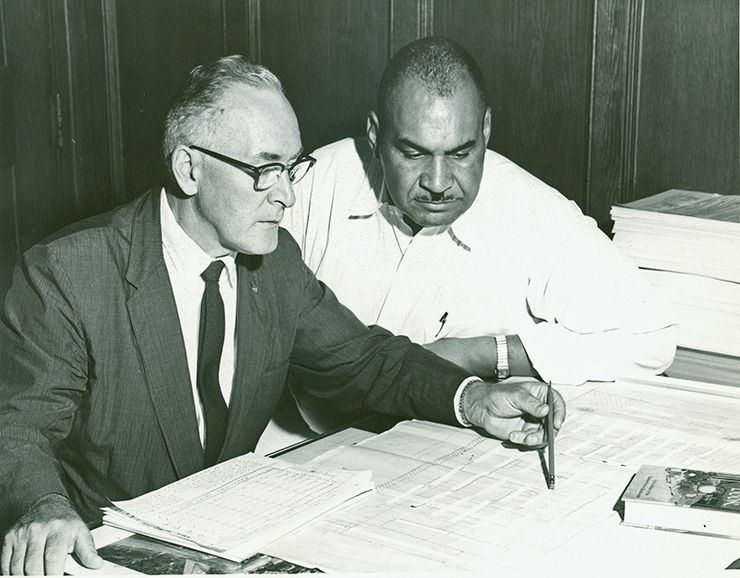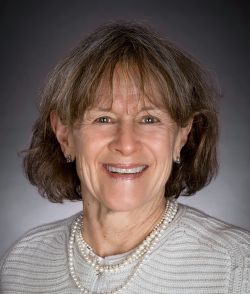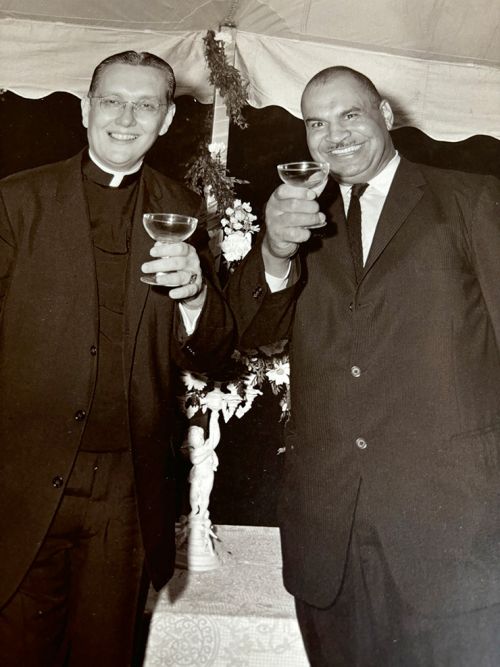Chef Bill Jones Broke Barriers at Duke
Sixty years after her wedding date, as Duke celebrates its Centennial, Mary Duke Trent Jones realized she had a photo of Bill Jones not shared before in public


“Big Bill” was the affable head of banquet services at Duke, and a pioneer among staff and faculty as the university’s first Black supervisor.
“He was just this enormous, big, huge guy – and just the kindest, sweetest man,” Trent Jones said.
Sixty years after her wedding date, as Duke celebrates its Centennial in 2024, Trent Jones realized she had something tucked away in her wedding album: A photo of Bill Jones not shared before in public.
‘Big Bill’
At 6 feet, 6 inches and close to 300 pounds, Bill Jones’ stature made it impossible to overlook him.
But his easy grin and outgoing nature is what made him a beloved figure when he worked at Duke through the 1980s.
Bill Jones was brought to Duke by Ted Minah, the director of Duke’s dining service hired in 1946 to modernize and improve the service.

Until Minah’s arrival, students regularly left comment and suggestions cards requesting things such as silverware, cream and to “pick out all of the rotten vegetables.”
Although it was the segregated South when Minah arrived at Duke, he knew Bill Jones would be an ideal banquet manager of the dining halls.
The two had known each other since 1937, when they worked together at Brown University.
Bill Jones began working at Duke not long after World War II, but the first five Black undergraduates didn’t enroll at the university until 1963 – just after Trent Jones graduated.
By then, Black employees had been working at Duke for years. The earliest employment data shows that in 1965, Black staff made up 28.5% of the workforce. In all, that was 1,602 of 5,621 employees who held clerical positions, prepared food in dining halls and worked as technicians.
A Friend to All

In 1970, after working with Bill Jones at Duke for nearly 30 years, Minah wrote, “I shall always consider it a great privilege to be associated with him for the past 33 years since we began working together in the Brown University Dining Halls back in 1937. He has taught me a great deal not only about the operation of a dining hall service but how to better understand my fellow man.”
Trent Jones saw that in his everyday interactions with her fellow students. According to a 2000 Duke Magazine article, students who had no financial need for employment would apply for a job with dining services just to work with him.
“He was always I just I remember him being very kind, very polite, and interested in what the students wanted to eat,” she said.
Though Trent Jones doesn’t remember exactly what food was served at her wedding – she suspects it was tea sandwiches that could be passed around following the afternoon ceremony – she remembers everything being organized impeccably.
There was cake, but not Jones’ specialty of cherries jubilee, which he often made for everything from intimate dinner parties to large student gatherings. A 1966 Durham Morning Herald article about his “flaming cooking presentation,” called his cherries jubilee “the hit of the show.”
Trent Jones just remembers “Big Bill” Jones always paid special attention to the smallest of details.
“He just did a beautiful job,” she said.
In the photo from her wedding album, Bill Jones is standing next to Rev. Dr. George Brinkmann Ehlhardt of the University of Dubuque, who had performed the Presbyterian ceremony.
Both are smiling broadly, raising their champagne glasses in a toast.
“He was just like a friend to all of us,” Trent Jones said.
Bill Jones was known not only for his friendly nature, but also for his flaming desserts. A 1966 Durham Morning Herald article recounted how he made both baked Alaska and cherries jubilee for a gathering of Duke Law Dames. Make your own version of his famous dessert by following his recipe below:

Send story ideas, shout-outs and photographs by writing working@duke.edu.
Follow Working@Duke on X (Twitter), Facebook, and Instagram.